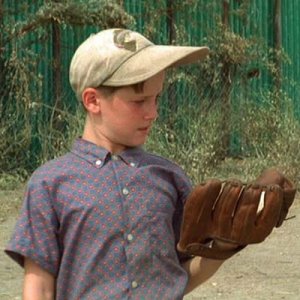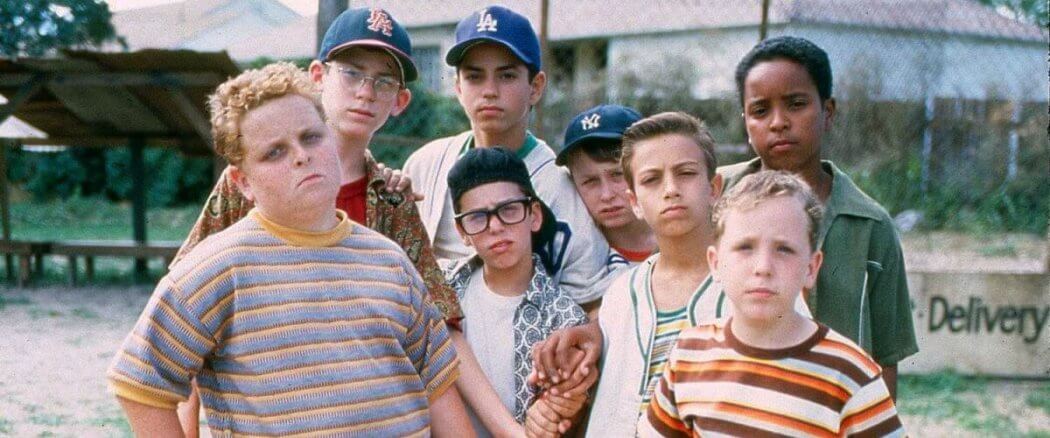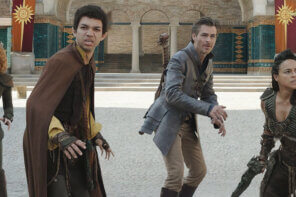There are a few seminal films from my childhood. Jurassic Park was a big one. Star Wars definitely left a mark too. But the first one I remember before either of those was The Sandlot. Yet, something more than nostalgia surprised me when I re-watched the film last week. Early on, I found myself tearing up. I don’t remember ever crying over the movie when I was a kid, but the tears came this time in a scene where the main character, Smalls, catches his first baseball because a boy named Benny gives him a chance to play.
What a beautiful example of Jesus’ love for the least of these.
Benny and Smalls
The Sandlot takes place in the year 1962. Baseball was still America’s favorite pastime then, and, on the surface, that’s what the film is about. But really, this is a movie about childhood and the friendships that define us. Smalls is the nickname for a boy named Scotty. Scotty is new in the neighborhood and doesn’t have any friends. He soon discovers a group of kids who play baseball together every day on a field they’ve nicknamed “The Sandlot.”
 Scotty doesn’t know how to play baseball. He has a pitiful baseball cap with a picture of a fish on it, and a toy glove he got from his Grandma. But Scotty sees something special about the Sandlot boys and he wants to be a part of it. He tries to stand in the outfield and not be noticed, but it’s only a matter of time before a ball gets hit to him. That’s when the team realizes that Scotty can’t catch or throw a baseball to save his life.
Scotty doesn’t know how to play baseball. He has a pitiful baseball cap with a picture of a fish on it, and a toy glove he got from his Grandma. But Scotty sees something special about the Sandlot boys and he wants to be a part of it. He tries to stand in the outfield and not be noticed, but it’s only a matter of time before a ball gets hit to him. That’s when the team realizes that Scotty can’t catch or throw a baseball to save his life.
The boys laugh and call Scotty names. But there’s one kid on the team who doesn’t laugh – the leader, Benny. Benny invites Scotty back to play. He even gives him a new glove. But once again, Scotty fails miserably. The team cracks up. Benny quiets them. He walks over to Scotty and shows him how to throw a baseball. Scotty seems to understand. “But how do I catch it?” he asks. “Just hold your glove up in the air. I’ll take care of the rest,” Benny replies.
Scotty holds his glove into the air. Benny hits a ball straight for him. The ball lands in the mitt with a thud. Scotty can’t believe it. He turns and manages a throw to second base. The boys aren’t laughing anymore. They can’t believe their eyes.
Benny jumps up and down with excitement. Scotty can’t stop smiling.
God Loves Underdogs
There’s a theme that runs through the Bible from cover to cover: God loves underdogs.
When the people rise up and demand a king, God gives them Saul from the weakest tribe in Israel. When Samuel goes to pick Saul’s successor, David isn’t even in the lineup. When God needs someone to speak to Pharoah, he picks a man terrified of public speaking.
The trend continues throughout the Old Testament, climaxing in the life of Jesus. Jesus shows affection toward prostitutes, tax collectors, and sinners. He picks uneducated fisherman to be his disciples. The testimony of women was invalid in a court of law – Jesus chooses them to be the first witnesses to his resurrection. Children were looked on with contempt – Jesus gathers them into his arms and makes them the litmus test for inheriting the Kingdom.
Even Jesus himself was an underdog. He could have come in power and riches, but he came as a helpless baby.
Perhaps an Audio Adrenaline spoken lyric says it best – “Underdog. I wince every time I say the word, especially in connection with Jesus. Yet, as I read the birth story about Jesus, I cannot help but conclude that, although the world may be tilted toward the rich and powerful, God – hallelujah, in his mercy – is tilted toward the underdog.”
This is the life Jesus led. And if we’re called to follow in his footsteps, our lives better look like this too.
Those People
In middle school, the world is divided between the geeks and the cool kids. I wish I could say the separation disappears when you become an adult, but that’s not true. Even in contemporary office settings, there are still “those people.” The only thing different about adulthood is we usually don’t mock people to their face. We just do it over drinks later on.
 Jesus wants us to seek out “those people” on the fringes of society and show them radical love. Maybe it’s the immigrant crew that replaces trash bags at the office. Maybe it’s the guy with weird clothes who talks funny two cubicles over. Maybe it’s the homeless person on the street begging for money. We need to keep our eyes open for those on the outside looking in. They’re the kind of people Jesus was drawn to like a magnet.
Jesus wants us to seek out “those people” on the fringes of society and show them radical love. Maybe it’s the immigrant crew that replaces trash bags at the office. Maybe it’s the guy with weird clothes who talks funny two cubicles over. Maybe it’s the homeless person on the street begging for money. We need to keep our eyes open for those on the outside looking in. They’re the kind of people Jesus was drawn to like a magnet.
This is a hard proposition. Loving the least of these will cost us. We may witness friends and families turn their back on us. We may lose social status and power. We may experience awkward conversations with no warm fuzzies or intimate breakthroughs.
We shouldn’t be surprised at the difficulty though. Jesus didn’t tell us to take up our Snuggie and follow him. He told us to take up our cross – that wooden death instrument attached to our body with nails. Loving the underdogs will require a death to ourselves, but in the world of the Kingdom, death is the only way to life.
Crossing the Fence
In The Sandlot, the boys are terrified of what lies beyond the fence of their baseball diamond. There’s a dog there they call “The Beast” and a scary old man named Mr. Mertle. But through a series of events, the boys end up crossing that fence and facing their fears head on. That’s when they realize things aren’t always what they seem. On the other side, the boys find a sea of hidden treasures including the only thing that can rescue Smalls from the pickle he’s in.
The same has been true in my own life.
When I crossed the fence and befriended the woman from Mexico who cleans my cubicle, I started getting invited to parties every month. Those people know how to party. Moms, dads, aunts, uncles, cousins, second cousins, third cousins – everyone shows up to dance late into the night. I soon learned that the entire ten person crew that cleans our building is a family. Their bond is infectious.
When I crossed the fence and moved into a predominately black neighborhood, I learned the value of relationship. I came from the white suburbs where I made small talk to my neighbors for two minutes before running inside and bolting the door. In my new neighborhood, people sit out on the porch and talk to each other for hours. Hours. That’s a valuable lesson for my task-oriented, run-to-the-next-meeting culture. We need to recapture what it means to be a neighbor. I’m still learning that one.
The secret about crossing the fence is that the people on the other side usually have more to teach us than we have to teach them. We sometimes go in with a savior complex only to discover that we’re the ones who need saving.
A Simple Act
What would have happened to Smalls had Benny not given him a chance to play ball that summer? Smalls probably wouldn’t have made a single friend that year. He certainly wouldn’t have gotten to know the game of baseball that he learned to love and build a career on. One simple act of kindness can change an entire life.
But I don’t think it was a one-sided exchange. If Benny hadn’t reached out to Smalls, he never would have inherited the pickle, which means he never would have faced the Beast and become the legend of his town. He also might not have gained the confidence he needed to make it to the major leagues years later.
Both Benny and Smalls learned something from each other, but it started with Benny being willing to cross the fence, even with his friends mocking him, even when it was awkward and hard.
Jesus calls us to go out into the world and teach the least of these how to play baseball. And maybe, in the process, the least of these will teach us how to truly live.





